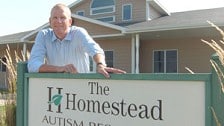For the Record: The Homestead serves people with autism

.floatimg-left-hort { float:left; } .floatimg-left-caption-hort { float:left; margin-bottom:10px; width:300px; margin-right:10px; clear:left;} .floatimg-left-vert { float:left; margin-top:10px; margin-right:15px; width:200px;} .floatimg-left-caption-vert { float:left; margin-right:10px; margin-bottom:10px; font-size: 12px; width:200px;} .floatimg-right-hort { float:right; margin-top:10px; margin-left:10px; margin-bottom:10px; width: 300px;} .floatimg-right-caption-hort { float:left; margin-right:10px; margin-bottom:10px; width: 300px; font-size: 12px; } .floatimg-right-vert { float:right; margin-top:10px; margin-left:10px; margin-bottom:10px; width: 200px;} .floatimg-right-caption-vert { float:left; margin-right:10px; margin-bottom:10px; width: 200px; font-size: 12px; } .floatimgright-sidebar { float:right; margin-top:10px; margin-left:10px; margin-bottom:10px; width: 200px; border-top-style: double; border-top-color: black; border-bottom-style: double; border-bottom-color: black;} .floatimgright-sidebar p { line-height: 115%; text-indent: 10px; } .floatimgright-sidebar h4 { font-variant:small-caps; } .pullquote { float:right; margin-top:10px; margin-left:10px; margin-bottom:10px; width: 150px; background: url(http://www.dmbusinessdaily.com/DAILY/editorial/extras/closequote.gif) no-repeat bottom right !important ; line-height: 150%; font-size: 125%; border-top: 1px solid; border-bottom: 1px solid;} .floatvidleft { float:left; margin-bottom:10px; width:325px; margin-right:10px; clear:left;} .floatvidright { float:right; margin-bottom:10px; width:325px; margin-right:10px; clear:left;}
The Homestead strives to meet the rapidly growing need for services for children and adults with autism, said Steve Muller, its executive director. The nonprofit organization was launched by a passionate group of parents in 1994.
“At the time, there was no one specializing in children’s disabilities, and sadly, too many organizations were lumping people with autism under the general classification of people with developmental disabilities,” Muller said. “What we’ve learned is (those methods) aren’t very effective for people with autism. But with the right types of support, we can see some phenomenal changes in personal growth and quality of life.”
The United States has experienced “an explosion in the number of kids with autism,” Muller said. “When we first got into this as an organization, maybe there was one (case of autism) in 1,000 children. Today, we see a frequency of around one in 150, some say even more.
“Our biggest concern is that as this wave of children with autism rolls into the adult system, the needs are going to be tremendous.”
The Homestead’s 220 employees provide services to about 150 children and adults with autism, primarily through community-based programs in the clients’ homes. It also operates a campus program with six houses serving 24 adults at its Pleasant Hill campus, which includes a 6-acre farm on which residents raise organic produce sold through a community-supported agriculture program. The Homestead also provides training and consultation to families and agencies.
The nonprofit’s $7.5 million annual budget comes primarily from Medicaid funding, with state and county matching funds. “We’ve operated with a thin management structure, investing most of our dollars in our frontline staff,” Muller said. “We have a very in-depth and comprehensive educational program for our staff to be equipped to apply these principles with the folks we support.”
The organization is currently expanding its work force and could add 50 to 60 additional part-time staff members, but finding people willing to work weekends and evenings is a challenge, Muller said.








